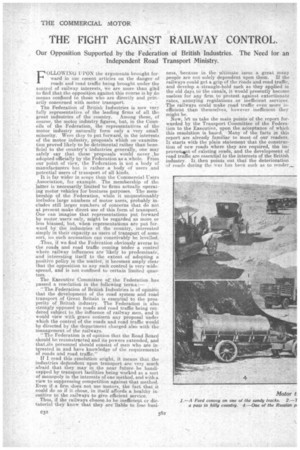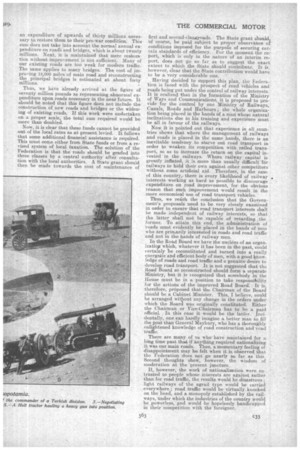THE FIGHT AGAINST RAILWAY CONTROL.
Page 12

Page 13

If you've noticed an error in this article please click here to report it so we can fix it.
Our Opposition Supported by the Federation of British Industries. The Need for an Independent Road Transport Ministry.
FOLLOWING I TON the arguments. brought forward in our recent articles on the danger of roads and road traffic being brought under the bono.n1 of railway interests, we are more than glad to find that the opposition against this course is by no means confined to those who are directly and prim
arily concerned with motor transport. • ....
The Federation of British Industries is now very fully representative of the leading firms of all the great industries of the country. Among these, of course, the motor industry figures, but, in the Councils of the Federation, the representatives of the motor industry naturally form only a very small minority. Were they to put forward, in the interests of the motor industry, proposals which on examination proved likely to be detrimental rather than beneficial to the country's industries generally, one may safely say that these proposals would never „be adopted officially by the Federation as a whole. From our point of view, the Federation is not a body of manufacturers but is rather a body of users and potential users of transport of all kinds. , It is far wider in scope than the Commercial Users Asso-ciation, for example. The membership of the. latter is necessarily limited to firms actually operating motor vehicles for business purposes. The membership of the Federation, while it unquestionably includes large numbers of motor users, probably includes still larger numbers of concerns that do not at present make direct use of this form of transport. One can imagine that representations put forward by motor.users only, might be regarded as more or less biassed, but., when representations are put forward by the industries of the country, interested simply in their capacity as users of transport of some sort, no such accusation can conceivably be levelled.
.Thus, if we find the Federation obviously averse to the roads and road traffic coming under a control where railway influences are likely to predominate, and interesting itself to the extent of adopting a posit ive policy in the matter, it becomes amply clear that the opposition to any such control is very -widespread, and is not confined to certain limited quarters, The Executive Committee of' the Federation has passed a resolution in the following terms :— "The Federation of British Industries is of opinion that the development of the read system and road transport of Great Britain is essential to the prosperity of British industry. The Federation is also strongly opposed to roads and road traffic being mu dered subject to the influence of railway men, and it would view with grave concern any proposal under which the control of the roads and road traffic would be directed by the department charged also with the management of the railways. • " The. Federation is of opinion that. the Road Board should he reconstructed and its powers extended, and that/its personnel should consist of men who are interested in and have knowledge of the requirements of roads and road traffic." .
If I read this resolution aright, it means that the industries dependent upon transport are very much afraid that they may in the near future be handicapped by transport facilities being worked as a sort of monopoly in the interests of one method, and with a view to suppressing competition against that method. Even if a firm does not use motors, the fact that it. could do so if it chose, in itself affords a healthy incentive to the railways to give efficient service. Thus, if the railways choose to he inefficiei}t or dictatorial they knew that they are liable to rose busi ness, because in the ultimate issue a great many people are not solely dependent upon them. If the railways could get a grip of the reads and road traffic, and develop astrangle-hold such as they applied in the old days to the canals, it would presently become useless for any firm to protest against extortionate rates, annoying regulations or inefficient services. The railways could make road traffic even more inefficient than themselves, however inefficient they might be. Now, let us take the main points of the report forwarded by the Transport Committee of the Federation to the Executive, upon the acceptance of which this resolution is based. -Many of the facts in this report are already familiar to most of our readers. It starts with the plain statement that the construction of new roads where they are required, the improveraant of existing roads, and the development of road traffic are essential to the interests of the British industry. It then points out that the deterioration of roads during the war has been such as to render_ an expenditure of upwards of thirty millions necessary to restore them to their pro-war condition. This sum does not take into account the normal annual expenditure on roads and bridges, which is about twenty millions. Next, it is maintained that mere restoration without improvement is net sufficient. Many of our existing roads are too weak for modern traffic. The same applies to many bridges. The cost of improving 18,000 miles of main road and reconstructing the principal bridges is estimated at, about forty mill ions.
Thus, we have Already arrived at the figure of seventy million pounds as representing abnormal expenditure upon roads necessary in the near future. It should be noted that this figure does not include the construction of new roads and bridges or the widening of existing roads. If this work were undertaken on a proper scale, the total sum required would be more than doubled. , Now, it is clear that these funds cannot be provided out of the local rates as at. present levied. It follows that some additional financial assistance is required. This must come either fro in State funds or from a revised system of local taxation. The solution of the Federation is that the roads should be graded into three classes by a 'central authority after consultation with the local authorities. A State grant should then be made towards the cost of maintenance of first and second-clawroads. The State grant should, of course, be paid subject to proper observance of conditions imposed for the purpoge of securing certain standards of efficiency. For the moment the report, which is only in the nature of an interim report, does not go so far as to suggest the exact extent to which the State should contribute. It is however, clear that the State contribution would have to be a very considerable one.
Having decided to support this plan, the Federation is faced with the prospect of road vehicles and roads being put under the control of railway interests. It is realized that in the formation of the Ministry of Ways and Communications, it is proposed to provide for the control by one Ministry of Railways, Canals, Roads and Harbours ; the whole organization being placed in the hands of a man whose natural inclinations due to his training and experience Must be all in favour of the railways.
Now it is pointed out that experience in all countries shows that where the management of railways and roads is placed in the same hands, there is an inevitable tendency to starve out road transport in order to weaken its competition with railed transport, so as to increase the return on the capital invested in the railways. Where railway capital is greatly inflated, it is more than usually difficult -for railways to held their own against other competitors without some artificial aid. Therefore, in the case of this country, there is every likelihood of railway interests working as hard as possible to discourage expenditure on road improvement, for the obvious reason that such improvement would result in the more economical use of road transport vehicles.
Thus, we reach the conclusion that the Government's proposals need to be very closely examined in order to ensure that road transport interests shall be made independent of railway interests, so that the latter shall, not be capable of retarding . the former. To attain this end, the administration of 'roads must evidently be placed in the hands of men who are primarily interested in roads and road traffic and not in the hands of railway men.
In the Road Board we have the nucleus of an organizatiop which, whatever it has been in the past, could certainly be reconstituted and turned into a really energetic and efficient body of men, with a good knowledge of roads and road traffic and a genuine desire to develop road transport. It is not suggested that the. Itoad Board so reconstructed should form a separate Ministry, but it is ecognized that somebody in the House must be in a position to take responsibility for the actions of the improved Road Board. It is. therefore, proposed that the Chairman of the Board should be a Cabinet Minister. This, I believe, could be arranged without any change in the orders under which the Boar a was originally constituted. Either the Chairman or Vice-Chairman has to be a paid official. In this case it would be the lager. Incidentally, one can hardly imagine a better Man 10 fill the post than General Maybury, who has a thoroughly enlightened knowledge of road construction and road traffic.
There are many of us who have maintained for a long time past that if anything required nationalizing it was our main roads. Thus, a momentary feeling of disappointment may be felt when it is observed that. the Federation does not go nearly so far as this. Second thoughts show, however, the wisdom of moderation at the present juncture.
If, however, the work of nationalization were entrusted to people whose interesti are against rather than for road traffic, the results would he disastrous; light railways of the agrail type would be carried everywhere ; road traffic would be virtually knocked on the head, and a monopoly established by the railways,-under which the industries of the country would be powerless, and would be hopelessly handicapped in their competition with the foreigner.






















